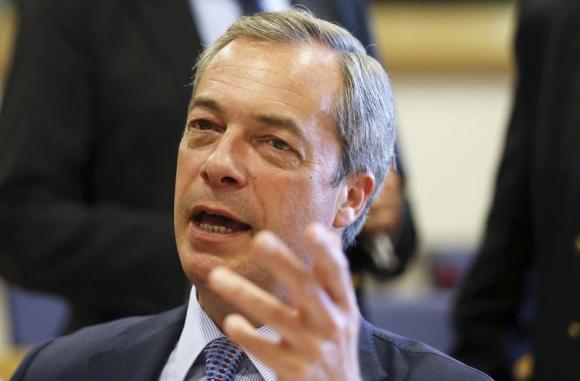In the wake of an Ofcom ruling granting the UK Independence Party “major party status”, the BBC has revised its guidelines on inclusion of UKIP within political features. The changes will give the party similar levels of coverage to that afforded to the Conservatives and Labour.
Although UKIP’s leader Nigel Farage will not receive as much airtime as Conservative Prime Minister David Cameron nor leader of the opposition, Labour’s Ed Miliband, it will mean significantly more coverage by the BBC for the insurgent party than it was given in the run up to the 2010 election, when the party gained 3.1 percent of the national vote, the Times has reported. UKIP is currently polling at around 18 percent in national polls.
Draft guidelines, which will need to go out to consultation before being enacted in March, state “In England and Wales, since 2010 when it secured 3.1 per cent of the vote, UKIP has demonstrated a substantial increase in electoral support in subsequent and different types of elections and there is consistent and robust evidence of increased support across relevant opinion polling.
“UK-wide programmes must ensure that UKIP is given appropriate levels of coverage in output to which the largest parties contribute and, on some occasions, similar levels of coverage.”
However, the BBC may not have been inspired by a desire to be democratically free and fair minded. Ric Bailey, the corporation’s chief political adviser, said it was “vital to make sure there is sufficient opportunity to test the record and hear the promises of those who want to govern us”.
“To put it simply, we believe that the electorate and licence fee payers are best served by giving the parties which demonstrate clear evidence of substantial electoral support more coverage (and indeed more scrutiny) in an election period than those who do not.”
If the BBC is hoping that, by scrutinising UKIP’s policies, it will make the party less popular it is likely to be sorely disappointed. It has long been noted that UKIP’s polling appears impervious to negative publicity, and that attacks by the media, dressed up as scrutiny, may even help.
Take, for example, the Guardian noting in April that “despite a bad week of publicity over its advertising campaigns for the European election and its expenses, [Ukip’s polling] has remained unchanged since a fortnight ago on 18%”. Likewise the Times’ Red Box, which in December ran a post entitled “For Nigel Farage, there’s no such thing as bad publicity”, lamenting “Controversy doesn’t really seem to hurt Mr Farage. In fact, the man thrives on it.”
The BBC itself has attempted to attack UKIP before: in October it aired a Panorama program in which a number of former party members were invited to dish dirt. For its efforts it received 800 letters of complaint of bias against UKIP, and an angry letter from Mr Farage.
Other left wing media outlets such as the Independent gleefully reported that the Corporation received nearly 1,200 complaints of bias in UKIP’s favour during the European election period, but YouGov polling shows that the public do think that there is widespread media bias against the party – 47 percent of those asked thought that media coverage was generally biased against UKIP, against 17 percent who thought the same for Labour, and just 14 percent who thought the same for the Conservatives.
All of this fits neatly into the narrative that the next election presents a choice between insurgent UKIP against the Lib-Lab-Con establishment, backed by an establishment media.
The changing rules make it more likely that UKIP will be included in the leaders’ debates in the run up to the election, although Bailey avoided confirming this, saying: “It’s too early to say what the outcome of the discussions on the election debates will be, but we and the other broadcasters remain confident of them going ahead and will continue to work with all the political parties in an attempt to ensure they happen again this year.”
Mr Farage’s inclusion may have appeared unlikely following his performance against Liberal Democrat leader Nick Clegg before the European elections. The two went head to head when Clegg challenged Farage to debate him on the matter of EU membership, saying “I challenged Nigel Farage to a debate because I wanted the British people to see that there is a very real choice at the upcoming European elections: between the Liberal Democrats as the party of ‘In’ and Ukip as the party of ‘Out’.”
In the event, Mr Farage won both debates with a healthy majority: by 68 percent to Clegg’s 27 percent in the second debate. As the dust settled, the BBC’s Nick Robinson intoned: “Some feared, others hoped [Farage] would struggle to survive for two hours toe-to-toe in live debate with the deputy prime minister. They were wrong.
“So does that mean that Nick Clegg’s idea to challenge him to debate has backfired and done so badly? Not necessarily.
“The Lib Dem leader saw this as an opportunity to present himself as the man with the guts not just to speak up for Britain’s membership of the EU but to stand up for modern Britain.
“History will record that Nigel Farage was the winner of these debates. Nick Clegg will hope that, nevertheless, he may have won something too by being seen to challenge Britain’s political insurgent.”

COMMENTS
Please let us know if you're having issues with commenting.